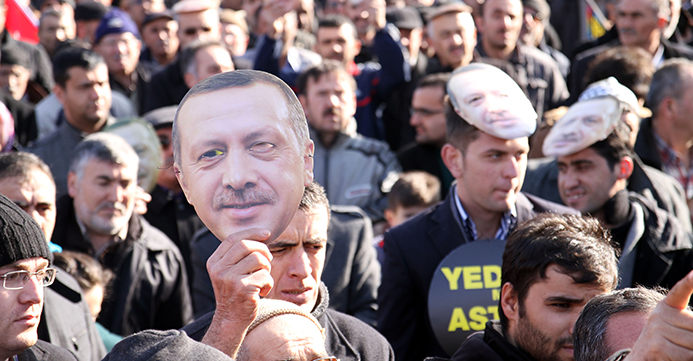The crystal-clear fact that surfaces with the December 17, 2013 (plot against the government) is that the normalization pains of Turkey will persist. The issue of how and by whom the politics will be shaped remains at the core of the normalization. This is where the debate on tutelage steps in.
Turkey has taken a big step forward by impeding the military tutelage in the last decade. It was possible to materially identify whether or not the military tutelage existed due to the current and past grotesque interventions of the armed bureaucracy. The judicial tutelary, assumed to have been disappeared along the military tutelage, on the other hand, is not as recognizable as the military tutelage was. Besides, the judiciary dwells in a protected world in perception and legal sense. Life and politics are being intervened by the world of the “rule of law” which is in need of a political, philosophical and moral questioning in the first place. The “independence of the judiciary” cliché is presented to preempt any such questioning.
Moreover, such clichés as “the rule of law” and “independence of the judiciary” are resorted to in this country which does not even have a Constitution that embraces the entire society, and, where more than half of all cases filed and admitted by the courts result in acquittal (less than half of the lawsuits filed on any subject result in a sentence).
The December 17, 2013 plot exposed how far the judicial tutelage may reach. The dossiers, names, subjects included in the second leg of the operation (on December 25, 2013), in particular, have been sufficient to clearly diagnose the tutelary attempt. Reading the events within the legal frame and through blind convictions such as “is the judiciary expected to participate in elections?!” are nothing but admission of the existence of a tutelary center. This is exactly what the problem is. Can “a center, which does not enter the elections,” take steps to directly determine the fate of politics by attempting an illicit operation? If it is impossible to agree on this principle, then we are facing a serious judicial, political and moral issue.
THE JUDICIARY-POLICE JOINT TUTELAGE
The most characteristic feature of the vulgar military tutelage was its projection of itself as a “savior.” The judicial tutelage, on the other hand, which is difficult to pinpoint and hides behind the shield of law, parallel state, ethics, independence and superiority, takes a step further and intervenes in politics from its “illusion of liberated -zone”. The military tutelage was a primitive kind that has relied on the power of arms through a primitive discourse. The judicial tutelary, on the other hand, intervenes in politics from an area of legitimacy through the Police with which it has an organic partnership. The military tutelage had a self-appointed responsibility to decide “appropriate-citizens” via grotesque codes of ideology. The judicial tutelary, however, believes that it can dictate politics to the elected via its power to decide what counts as a criminal offense and whether or not to judge the offender.
In order to comprehend the political codes of the judiciary-police joint tutelary attempt, dated December 17, 2013, one should trace back to the February 7, 2013 incident. The February 7 incident was an attempt to judge the policy generated by the elected willpower to settle the Kurdish question, the most critical issue of Turkey to date. It is beneficial to remember that the opposition figures, quitter eager to sugarcoat the December 17 operation with simplistic legal principles, simply went off the tangent to the February 7 incident. The neo-tutelary center has certain ideas in a number of issues, from the Kurdish question to the Turkish foreign policy on Iran, from economic policies to the politics in Syria, from the perceptions that are easy to digest in the West to the political language of government.







